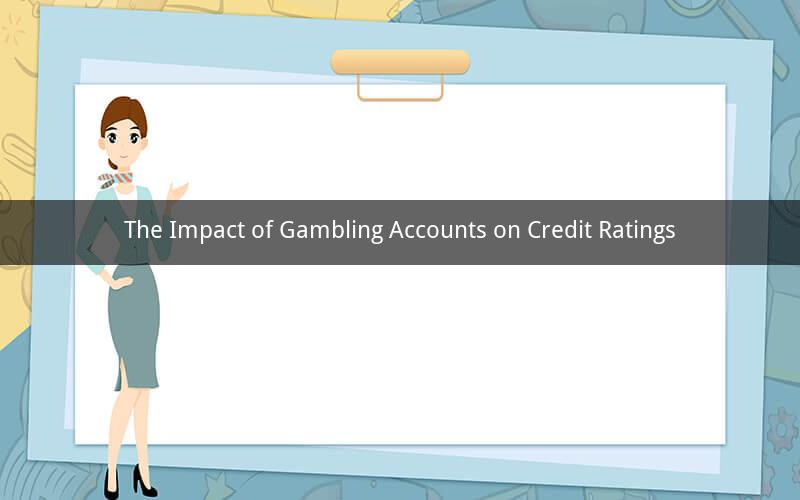
Gambling has become an increasingly popular form of entertainment and leisure, with many individuals participating in online gambling platforms. With the convenience of accessing these platforms from the comfort of one's home, it is no surprise that the number of gambling accounts has been on the rise. However, many are curious about the potential impact of gambling accounts on credit ratings. This article aims to explore this topic in detail, discussing how gambling accounts can affect credit ratings and the factors that contribute to this correlation.
The Relationship Between Gambling Accounts and Credit Ratings
Credit ratings are used by financial institutions to assess the creditworthiness of individuals, determining their eligibility for loans and credit cards. A high credit rating indicates a low credit risk, while a low credit rating suggests a higher risk. When it comes to gambling accounts, the relationship with credit ratings can be complex.
1. The Role of Credit Cards in Online Gambling
One of the most common methods of funding gambling accounts is through credit cards. While using a credit card for gambling is a personal choice, it can have implications on credit ratings. Here are some key points to consider:
- Credit card usage can increase your credit utilization ratio: If you use your credit card to fund your gambling account, you may accumulate debt that can lead to a higher credit utilization ratio. A high credit utilization ratio can negatively impact your credit rating.
- Missing credit card payments: If you fail to pay off your credit card balance, your credit rating can be affected. This is because missing payments is considered a sign of financial instability and can result in a lower credit rating.
2. The Effect of Debt on Credit Ratings
Gambling can be an expensive hobby, and for some individuals, it can lead to substantial debt. Here are some ways in which gambling-related debt can affect your credit rating:
- High debt-to-income ratio: If you accumulate gambling-related debt, it can increase your debt-to-income ratio, which is a significant factor in determining your credit rating. A high debt-to-income ratio can lead to a lower credit rating.
- Collection accounts: If you fail to pay off your gambling debt, collection agencies may be involved. Collection accounts can severely damage your credit rating and remain on your credit report for up to seven years.
3. The Impact of Bankruptcy on Credit Ratings
In extreme cases, gambling-related debt can lead to bankruptcy. Bankruptcy is a severe financial event that can have long-lasting consequences on your credit rating. Here are some key points to consider:
- Bankruptcy stays on your credit report for up to ten years: A bankruptcy filing can significantly lower your credit rating and make it difficult to obtain credit for a significant period.
- Difficulty in obtaining new credit: Even after the bankruptcy stays are removed from your credit report, you may still face challenges in obtaining new credit due to your lower credit rating.
How to Protect Your Credit Rating When Using a Gambling Account
If you choose to engage in online gambling, there are steps you can take to minimize the impact on your credit rating:
1. Pay off credit card balances promptly: Ensure you pay off your credit card balance in full each month to avoid accumulating debt and maintaining a low credit utilization ratio.
2. Set a budget: Establish a budget for your gambling expenses and stick to it. This will help you manage your debt and prevent it from spiraling out of control.
3. Monitor your credit report: Regularly check your credit report for any errors or discrepancies that could be affecting your credit rating.
5 Questions and Answers
Q1: Can using a gambling account lead to a lower credit rating?
A1: Yes, using a gambling account can lead to a lower credit rating if you accumulate debt, miss credit card payments, or file for bankruptcy due to gambling-related expenses.
Q2: Will opening a gambling account negatively impact my credit rating?
A2: No, simply opening a gambling account will not negatively impact your credit rating. However, using credit cards to fund your gambling account and managing debt can affect your credit rating.
Q3: Can I improve my credit rating after experiencing gambling-related financial issues?
A3: Yes, it is possible to improve your credit rating after experiencing gambling-related financial issues. You can take steps such as paying off your debt, monitoring your credit report, and maintaining good credit habits.
Q4: Should I close my gambling account to improve my credit rating?
A4: Closing your gambling account will not directly improve your credit rating. However, managing your debt and maintaining a low credit utilization ratio can help improve your credit rating.
Q5: Is there a way to prevent gambling-related financial issues from affecting my credit rating?
A5: The best way to prevent gambling-related financial issues from affecting your credit rating is to set a budget, stay within your means, and avoid taking on excessive debt. Additionally, maintaining a good relationship with your creditors and monitoring your credit report can help you address any potential issues before they worsen.
In conclusion, the relationship between gambling accounts and credit ratings is a complex one. While engaging in online gambling can have various financial implications, it is crucial to manage your credit responsibly to protect your credit rating. By staying within your budget, paying off your debt, and maintaining good credit habits, you can minimize the impact of gambling on your financial well-being.